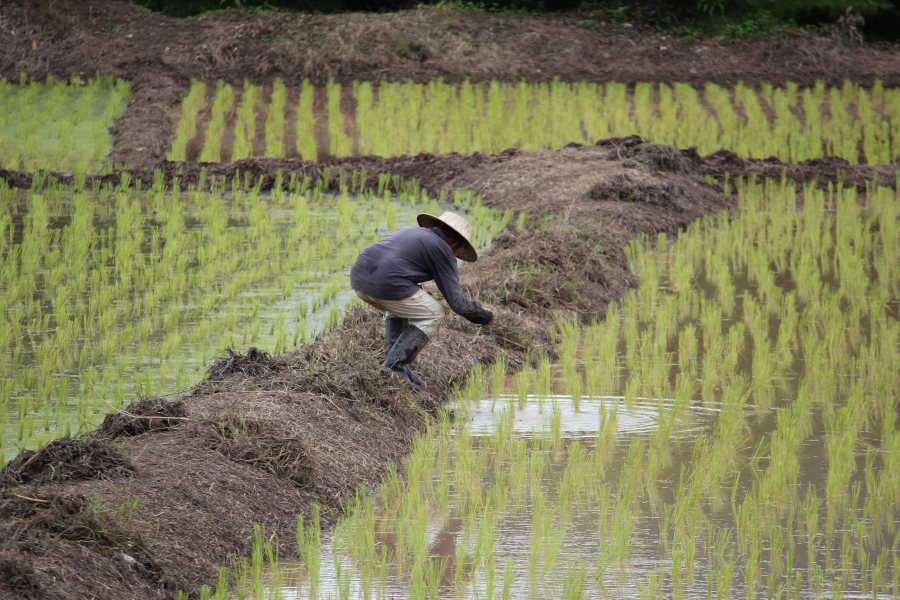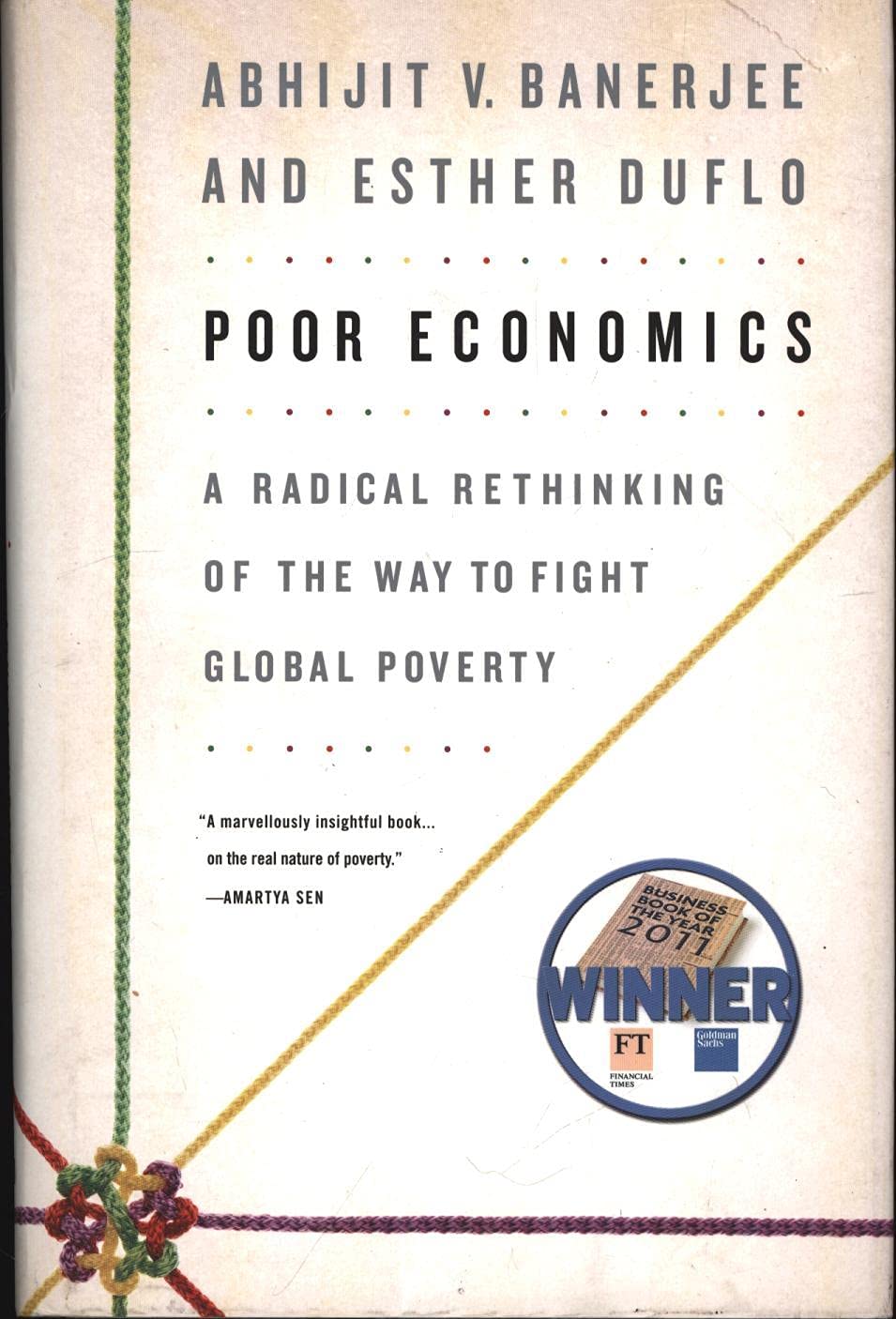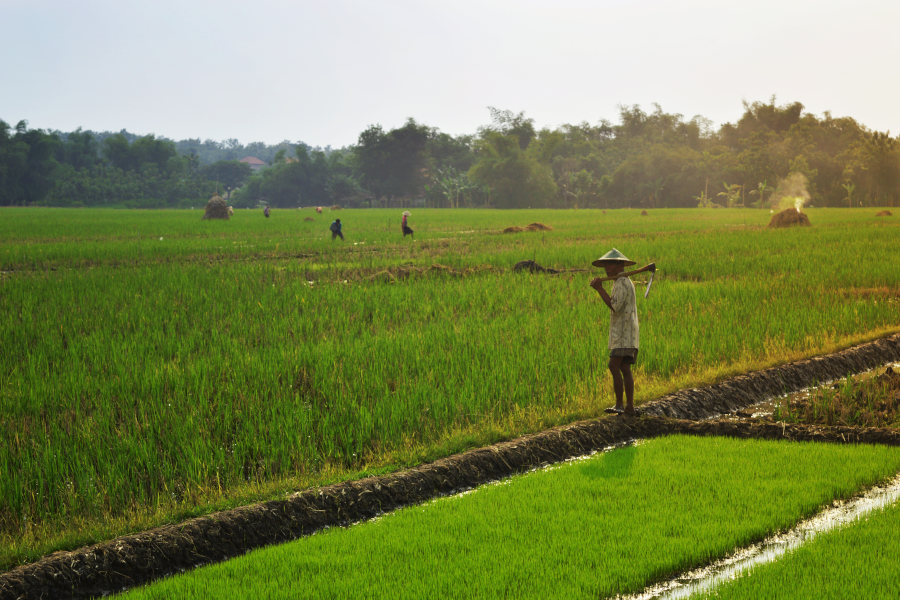Crop residue burning by smallholder farmers in Thailand is a significant contributor to greenhouse gas emissions and air pollution. How can this behaviour be changed and what are the obstacles to the adoption of more sustainable practices?
This was the challenge that RADMA scholar Nopparuj Chindasombatcharoen addressed as part of his PhD ‘Psychological insights for sustainable agricultural transformation’.
Nopparuj explains: “Smallholder rice farmers globally often burn residues after harvesting as this is the most convenient and cost-effective method. There are alternative approaches that are more sustainable and I was interested to understand both the functional and psychological barriers hindering adoption.”

Design of the study to identify barriers and potential interventions
“Through a mixed-methods approach, I investigated the behavioural insights influencing farmers’ decision-making regarding the adoption of sustainable residue management (SRM) practices,” Nopparuj continues. “A qualitative, exploratory phase to identify the functional and psychological barriers hindering adoption, created insights into how external agricultural interventions can be used to motivate farmers to adopt SRM.
“Building on these insights, I conducted a lab-in-the-field experiment with 250 smallholder rice farmers in northeastern Thailand. Farmers were divided into control and treatment groups receiving different interventions to determine their impact on SRM adoption decisions.
“This research provided valuable insights into the psychology behind their decision-making, which could aid government strategies in designing more effective interventions to promote sustainable agricultural practices.”

Unintended consequences from policy interventions
“One of the most interesting observations from my research is that policy interventions often result in unexpected outcomes.
“The assumptions made in economic models frequently do not hold true in real-world scenarios, especially when there is a significant disconnect between policymakers and the beneficiaries of these policies.
“In my research, I found that farmers operate within complex contexts that are often not fully understood by those designing the interventions. This complexity leads to outcomes that differ from the anticipated effects, highlighting the need for a more nuanced understanding of the local conditions and behavioural factors at play.
Winner of the Samaggi Samagom Research Competition
“I shared my research findings at multiple conferences, such as the EurOMA Conference in 2021 and 2022, as well as the R&D Management Conference and EEPSEA Annual Meeting in 2023.
“Additionally, I was delighted to win the Samaggi Samagom Research Competition 2022 and secured 2nd runner up at the 2021 IfM PhD Conference. Furthermore, I have two papers submitted to journals, which are presently under review.
Rethinking poverty with behavioural insights
“My work builds on the research of several behavioural economists who have employed field experiments to delve into the complexities of human behaviour.
“For those new to this area, I highly recommend reading the works of the 2019 Nobel Prize winners in Economic Sciences: Esther Duflo, Abhijit Banerjee, and Michael Kremer.
“Esther Duflo and Abhijit Banerjee co-authored “Poor Economics: A Radical Rethinking of the Way to Fight Global Poverty,” which explores how small changes can make a big difference in the fight against poverty, based on extensive field research. Their work emphasizes the importance of understanding the actual conditions and behaviours of people living in poverty to design effective interventions.
“Michael Kremer’s contributions included utilizing randomized controlled trials (RCTs) to test the effectiveness of various interventions in education, health, and other areas. His research has demonstrated the value of using empirical evidence to guide policy decisions, which has significantly influenced the field of development economics.”

What support did you get from RADMA and how did it help you?
“My doctoral studies journey was significantly enhanced by the generous support received from RADMA. Their assistance came in two forms, each playing a vital role in my academic and research endeavors.
“First, I received the RADMA Doctoral Studies funding, which helped cover my tuition fees and living expenses throughout my PhD. This was in addition to the part-funding I received from Thailand Development Research Institute (TDRI), a non-government think tank based in Bangkok. This financial support allowed me to focus fully on my studies and research without the financial stress often associated with postgraduate education.
“Secondly, RADMA provided support through their Postgraduate Student Research Support programme. This funding was pivotal in enabling a unique and ambitious field experiment that formed the cornerstone of my doctoral research. With this support, I was able to travel to 25 farmer villages in Northeastern Thailand to conduct a lab-in-the-field experiment. This hands-on research experience was invaluable, providing rich, primary data that significantly enhanced the depth and relevance of my study.
“As I reflect on my PhD journey, I recognize that RADMA’s support was more than just financial; it was a vote of confidence in my research potential and a catalyst for meaningful academic exploration. The experience and knowledge gained through this support will undoubtedly continue to shape my career and contribute to the field in the years to come.”
What are you doing now and does this build on your knowledge of R&D Management?
“I am currently working as a Research Fellow at the Thailand Development Research Institute (TDRI), where I head the Industrial Development Policy team.
“My work at TDRI involves conducting policy research to create sustainable development of Thailand’s key industries. This role builds on my knowledge of R&D and innovation management by emphasizing the crucial link between industrial policymaking and the entire spectrum of R&D activities.

“Effective industrial policy must connect to upstream R&D efforts and downstream activities such as commerce and international trade. Understanding how R&D can drive innovation and competitiveness in industries is essential for creating policies that foster sustainable development.”
What do you think RADMA offers the research community?
“RADMA provides invaluable support to the research community by providing PhD scholarships as well as funding innovative projects and conference attendances. This enables researchers to explore novel ideas and conduct in-depth studies that might otherwise lack the necessary resources.
“Additionally, RADMA’s activities include opportunities for networking, knowledge exchange, and professional development, which are crucial for advancing research careers.
“The R&D Management Conference has been a valuable venue for meeting fascinating researchers from all over the world, leading to subsequent invitations for presentations and broadening my professional network and experience. This holistic support system helps in driving forward cutting-edge research, promoting interdisciplinary collaboration, and ultimately contributing to significant advancements in various fields of study.”
Nopparuj is a Research Fellow at the Thailand Development Research Institute (TDRI)
Find Nopparuj on LinkedIn and on the Thailand Development Research Institute website.

